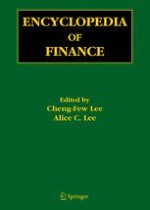2006 | OriginalPaper | Chapter
48. The Le Chatelier Principle of the capital market equilibrium
Authors : Chin-Wei Yang, Ken Hung, John A. Fox
Published in: Encyclopedia of Finance
Publisher: Springer US
Activate our intelligent search to find suitable subject content or patents.
Select sections of text to find matching patents with Artificial Intelligence. powered by
Select sections of text to find additional relevant content using AI-assisted search. powered by
